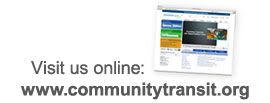Tuesday, April 16, 2013
Legislative Funding Update & Drewel Support
We're just under two weeks from the end of the 2013 legislative session and the good news is that transit funding is still alive!
Thanks to late, but vocal support from Gov. Jay Inslee and continued pressure from a variety of interests from business coalitions to transit agencies to sustainable living groups, the notion of a statewide transportation (roads and transit) funding package remains in play.
The latest House package dedicates some money for transit and contains a local option for additional sales taxes that would require voter approval. Legislators have volleyed back-and-forth about local option funding for transit, from vehicle registration fees to motor vehicle excise taxes (MVET) to sales taxes.
I was asked by a reporter today why Community Transit would support a sales tax option. The fact is we went to legislators this year asking for new funding, period. After the cuts our customers have sustained during the recession, we want to provide better transit service for Snohomish County.
We specifically asked for MVET as a funding source because it is more stable than sales tax in an economic downturn, and together both sales tax and MVET would provide a more diversified funding base for Community Transit. However, it is legislators who will decide which funding options we get.
Two years ago, a temporary congestion relief car-tab fee bill was written for Community Transit, but by the end of the session we were removed from that bill. Only King County Metro benefited from that legislation, and that kept that agency from major cuts these past two years.
At this time, we are past the cuts; we're ready to grow, and the demand for transit in Snohomish County is real. What we hope to get from this Legislature is the ability to go to our community and make the case that transit is important for a growing economy. Economic Alliance Snohomish County, the Boeing Machinists Union, United Way and other local organizations have supported Community Transit in Olympia this session to ask for more transit funding because they also believe it is vital to our community.
The funding source will be what it will be, we have no control of that. All types of taxes have been considered: property tax, household tax, business and occupation tax. Right now, legislators are gravitating toward sales tax. No tax is popular, but our voters can decide if better transit service is worthy of their support, and Community Transit would rather have that option than not have it.
Today, speaking at the Smart Commuter Awards luncheon in Lynnwood, Puget Sound Regional Council Executive Director (and former Snohomish County Executive) Bob Drewel praised the work of businesses that work to reduce drive-alone trips to their workplaces and also called on them to support increased funding for transit. He mentioned the legislation still alive in Olympia and said that as a community we should all support these partnerships and the service they provide.
Thanks to late, but vocal support from Gov. Jay Inslee and continued pressure from a variety of interests from business coalitions to transit agencies to sustainable living groups, the notion of a statewide transportation (roads and transit) funding package remains in play.
The latest House package dedicates some money for transit and contains a local option for additional sales taxes that would require voter approval. Legislators have volleyed back-and-forth about local option funding for transit, from vehicle registration fees to motor vehicle excise taxes (MVET) to sales taxes.
I was asked by a reporter today why Community Transit would support a sales tax option. The fact is we went to legislators this year asking for new funding, period. After the cuts our customers have sustained during the recession, we want to provide better transit service for Snohomish County.
We specifically asked for MVET as a funding source because it is more stable than sales tax in an economic downturn, and together both sales tax and MVET would provide a more diversified funding base for Community Transit. However, it is legislators who will decide which funding options we get.
Two years ago, a temporary congestion relief car-tab fee bill was written for Community Transit, but by the end of the session we were removed from that bill. Only King County Metro benefited from that legislation, and that kept that agency from major cuts these past two years.
At this time, we are past the cuts; we're ready to grow, and the demand for transit in Snohomish County is real. What we hope to get from this Legislature is the ability to go to our community and make the case that transit is important for a growing economy. Economic Alliance Snohomish County, the Boeing Machinists Union, United Way and other local organizations have supported Community Transit in Olympia this session to ask for more transit funding because they also believe it is vital to our community.
The funding source will be what it will be, we have no control of that. All types of taxes have been considered: property tax, household tax, business and occupation tax. Right now, legislators are gravitating toward sales tax. No tax is popular, but our voters can decide if better transit service is worthy of their support, and Community Transit would rather have that option than not have it.
Today, speaking at the Smart Commuter Awards luncheon in Lynnwood, Puget Sound Regional Council Executive Director (and former Snohomish County Executive) Bob Drewel praised the work of businesses that work to reduce drive-alone trips to their workplaces and also called on them to support increased funding for transit. He mentioned the legislation still alive in Olympia and said that as a community we should all support these partnerships and the service they provide.
Subscribe to:
Post Comments (Atom)







No comments:
Post a Comment